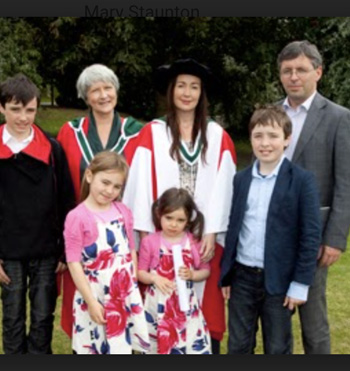Marina Carr
UNIVERSITY COLLEGE DUBLIN
HONORARY CONFERRING
Wednesday, 31 August 2011 at 4.30 p.m.
TEXT OF THE INTRODUCTORY ADDRESS DELIVERED BY DR CATHY LEENEY, UCD School of English, Drama and Film, University College Dublin on 31 August 2011, on the occasion of the conferring of the Degree of Doctor of Literature, honoris causa on MARINA CARR
President, Distinguished Colleagues, Ladies and Gentlemen
 The theatre goes back a long way. And playwrights are an extraordinary kind of writer – creating texts that may be read within the relative safety of book covers, but primarily bringing into being through language a set of performance possibilities. The playwright is concerned with language in the mouths of actors.
The theatre goes back a long way. And playwrights are an extraordinary kind of writer – creating texts that may be read within the relative safety of book covers, but primarily bringing into being through language a set of performance possibilities. The playwright is concerned with language in the mouths of actors.
It is arguably the hardest kind of writing, this adventure of language in human bodies, in space, in real time. Its life blood is the tension between control and the passionately held vision of the writer, and the wild risk in handing over the work into the imaginations and talents of others, and into the vagaries of circumstance and time passing. The playwright is a public figure as the theatre is a public art.
Marina Carr is a playwright of genius, distinguished, accomplished, and fearless. A woman warrior, the power of her creativity has made theatre that is huge in its achievement, stunningly theatrical, and internationally recognised as remarkable. The philosophical, emotional and poetic scale of her work shows audiences a world where life is intense, tragic, and hilarious; where the conversation between life and death spans the oily currents of the Styx: this is a bigger life. Her work is loved and admired by audiences and by theatre people. Her importance to students of theatre worldwide would be hard to underestimate.
She is intensely aware of her vocation as a writer, a forger of language, part of a great tradition of Irish playwrights as magicians of the word. Her work consciously links into the theatrical traditions of Europe too, back to the Greeks, to Shakespeare, Ibsen, to Chekhov, so that it bridges Ireland’s island isolation to connect with the children of Apollo, ‘the Poet God’, as she calls him.
Her success at this young point in her life, rests on a prolific oeuvre that includes early plays such as Low in the Dark and The Mai, her widely performed Portia Coughlan and By the Bog of Cats; and in the current century, On Raftery’s Hill, Woman and Scarecrow, Marble, and her latest and eagerly awaited, 16 Possible Glimpses.
If you were to know that Marina Carr was born in Co. Offaly in 1964, you might also imagine her childhood love of making theatre in the family shed: ‘we lay boards across the stacked turf, hung an old blue sheet for a curtain and tied a bicycle lamp to a rafter […] so that its light would fall at an angle on the stage […] We loved the havoc, the badness, the blood spillage, but loved equally restoring some sort of botched order and harmony.’ (pp.ix-x)
If you knew that Carr attended UCD as an undergraduate, studying English and Philosophy, you might not be surprised that she loves the work of Plato, whose inspiration is in the soul journeys of her characters across the veil that separates mortal life from the underworld, and into the impossible human longing for the purity of true forms. And it stands to reason that she loved the work of Samuel Beckett, whose statement that ‘there is nothing so funny as unhappiness’ flashes powerfully in her plays.
Marina Carr’s luminous theatre points a way for all young playwrights and for young women in particular. Recognitions of her outstanding contribution to Irish and international culture are many, including membership of Aosdána, Appointment as Heimbold Professor of Irish Studies at Villanova University, as Writer in Residence at the Abbey Theatre and as Adjunct Professor of Drama at Trinity College. She is the recipient of many awards including the American Ireland Fund Literary Award, the E.M. Forster Award, and the Susan Smith Blackburn Prize.
Her plays are performed and acclaimed across the world and in many languages; they attract the most talented performers, directors and designers. In Dublin her works for children have had rapturous receptions from young audiences at the Peacock and Ark Theatres.
Carr’s grace and generosity inform every aspect of her role as a writer in the public sphere, as author, teacher and advisor. She once said: ‘We are as much not of this world as we are of it.’ Her exploration of how we are human, how we are alive, is the heart and soul of her drama. Perhaps there is no more urgent context for her enquiry into this paradoxical mystery than now, as the Earth itself falters under the burden of our human race. In sight of the darkness, Carr’s work celebrates the glory, the terror and the privilege of being here.
Praehonorabilis Praeses, totaque Universitas,
Praesento vobis hanc meam filiam, quam scio tam moribus quam doctrina habilem et idoneam esse quae admittatur, honoris causa, ad gradum Doctoratus in Litteris; idque tibi fide mea testor ac spondeo, totique Academiae.